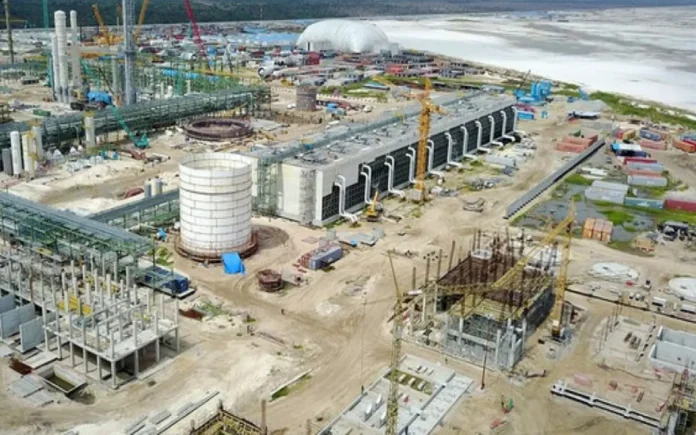Breaking News: The Latest Price Slash
Headline Update:
Dangote Petroleum Refinery announced its second petrol price reduction in nine days, slashing the ex-depot price from ₦840 to ₦820 per litre effective July 8, 2025.
Rapid Declines:
This follows a reduction from ₦880 to ₦840 per litre on July 1, 2025, marking a total drop of ₦60 per litre in under two weeks.
Official Confirmation:
Group spokesman Anthony Chiejina stated the move aims to make petrol more affordable for Nigerians amidst economic pressures.
Decoding the Price Reduction: Causes and Mechanisms
Global Oil Market Influence:
The initial June price hike to ₦880 was triggered by Middle East conflicts, pushing crude above $77/barrel. Recent crude price drops below $70/barrel enabled these cuts.
Dangote’s Strategic Intent:
The refinery prioritizes shielding Nigerians from volatile global swings, maintaining cuts despite a recent OPEC+-driven crude price uptick. Aggressive pricing aims to capture market share and pressure competitors.
| Date | Price (₦/Litre) | Change | Trigger Factor |
|---|---|---|---|
| Late June 2025 | ₦880 | Increase | Middle East conflicts, crude surge |
| July 1, 2025 | ₦840 | ▼₦40 | Crude fall below $70 |
| July 8, 2025 | ₦820 | ▼₦20 | Sustained lower crude prices |
Immediate Impact on Consumers and the Fuel Market
Pump Price Drops:
Stations linked to Dangote are lowering retail prices: Lagos/Ogun prices fell to ₦875-₦890/L from previous peaks. MRS reduced prices to ₦905/L in Abuja and ₦895/L in Lagos after the July 1 cut. Further reductions below ₦885/L are anticipated nationwide.
Competitive Responses:
NNPC Retail dropped Abuja prices to ₦910/L. Major marketers including Fatgbems, Integrated, and Bovas have adjusted ex-depot prices between ₦836-₦837.
Broader Economic and Social Implications
Inflation Relief:
Economists project Dangote’s planned CNG-powered distribution using 4,000 trucks and substantial logistics investment will significantly lower transport costs, helping curb headline inflation.
MSME Support:
Cheaper fuel reduces operational costs for over 42 million micro-businesses reliant on generators and transport.
Consumer Burden Eased:
Lower transport fares and reduced generator costs directly increase household disposable income.
| Sector | Direct Impact | Long-Term Benefit |
|---|---|---|
| Transportation | Lowered fares, reduced logistics costs | Cheaper goods & services |
| Power (Gen. Sets) | Reduced cost of backup electricity | Enhanced productivity for SMEs/homes |
| Agriculture | Cheaper fertilizer transport, distribution | Potential decrease in food prices |
| Inflation | Immediate pressure on transport CPI eased | Potential for broader price stabilization |
Behind the Scenes: Dangote’s Logistics Revolution
Direct Distribution Gamble:
Starting August 15, 2025, Dangote will bypass traditional marketers, delivering PMS and diesel directly to dealers, manufacturers, telecoms, and airlines using 4,000 new CNG-powered tankers.
Financing Incentives:
The refinery offers credit facilities like 500,000 litres with bank guarantees to attract large-volume buyers.
Industry Backlash:
Traditional marketers warn this model could jeopardize depots and retailers, potentially causing massive job losses in existing distribution chains.
Context: Dangote’s Market-Disrupting Journey
Capacity & Scale:
As Africa’s largest refinery with 650,000 barrels per day capacity, Dangote aims to end Nigeria’s historic reliance on imported fuel.
History of Price Wars:
In early 2025, Dangote forced prices down from ₦1,200 per litre to ₦860, sparking temporary conflict with NNPC over crude supply.
Strategic Shift:
Recent cuts signal Dangote’s renewed pricing influence following NNPC détente and stabilizing global oil markets.
Challenges and Controversies
Sustainability Questions:
Market analysts question whether current pricing can hold if crude surges beyond $80 per barrel again.
Market Distortion Fears:
Competitors argue aggressive pricing could stifle competition and innovation long-term.
Job Loss Concerns:
Direct distribution models threaten thousands employed in traditional fuel marketing roles nationwide.
The Road Ahead: What Nigerians Can Expect
Short-Term Outlook:
Pump prices will continue falling as Dangote-linked stations and competitors make further adjustments.
Medium-Term Transformation:
The August CNG distribution launch could trigger additional price reductions while intensifying market disruption.
Long-Term Potential:
Sustained price stability appears achievable if domestic refining capacity successfully insulates Nigeria from global oil shocks.
Dangote Refinery isn’t just selling fuel; it’s rewriting Nigeria’s energy playbook. While recent price cuts offer immediate relief at the pumps, the true revolution lies ahead with its CNG distribution network. Consumers and SMEs stand to gain significantly, but the refinery’s aggressive strategy challenges traditional players and could reshape an entire industry – proving that in Nigeria’s fuel economy, Dangote increasingly holds decisive influence over market dynamics.


